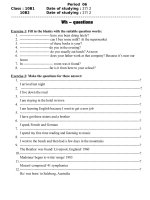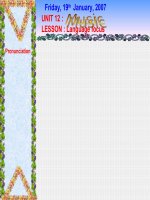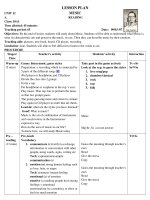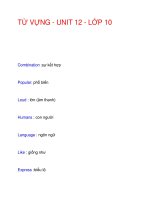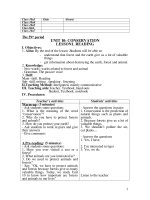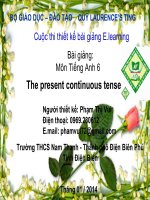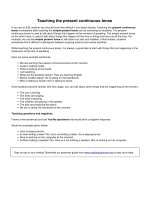UNIT 12 lớp 10 THE PRESENT CONTINUOUS TENSE
Bạn đang xem bản rút gọn của tài liệu. Xem và tải ngay bản đầy đủ của tài liệu tại đây (347.4 KB, 8 trang )
GRAMMAR
I. PRESENT SIMPLE (THÌ HIỆN TẠI ĐƠN)
BÀI TẬP VẬN DỤNG CƠ BẢN
I. Put the verbs into the correct form (present simple tense).
1. Mr. Nam often (teach) ………………….. the dogs new tricks.
2. We always (throw) ………………….. our litter in the bin.
3. The referee usually (stop) ………………….. the game after 90 minutes.
4. The children (hurry) ………………….. to open their gifts.
5. He (speak) ………………….. English well.
II. Make questions for the underlined part of the sentence.
1. Daisy goes to school from Monday to Saturday.
………………………………………………………..
2. My father has a cage in the garden.
………………………………………………………..
3. The children like dogs because they are nice.
………………………………………………………..
4. Kelly is never late.
………………………………………………………..
5. Mike’s new mountain bike costs £100.
………………………………………………………..
III. Complete the sentence with the correct form of the verbs in the box.
wake(s) up - open(s) - speak(s) - take(s) -do(es)
- cause(s) - live(s) - play(s)- close(s) -live(s) - drink(s)
1. Nick ………………………………. baseball very well.
2. I never ………………………………. coffee.
3. The swimming pool ………………………………. at 8.00 in the morning.
4. It ………………………………. at 9.00 in the evening.
5. Bad driving ………………………………. many accidents.
6. My parents ………………………………. in a very small house.
7. The Olympic Games ………………………………. place every four years.
8. They are good students. They always ………………………………. their homework.
9. My students ………………………………. a little French.
10. I always ………………………………. early in the morning.
IV. Fill in the blank with only ONE suitable word.
Mr. John gets up very early (1) .................... day. He washes his face and takes a quick shower (2) ....................
the mornings. His best friend, Bobby, also wakes up very early. Mr. John (3) .................... the breakfast for both.
They both (4) .................... like drinking milk but they love eating meat. Then, Mr. John (5) .................... Bobby
out to the park. Mr. John (6) .................... a graphic designer. He (7) .................... an office worker. He
(8) .................... from home. He designs beautiful images for an advertising company. He (9) .................... lunch
(10) .................... half past twelve. Then he (11) .................... start work immediately. He (12) .................... with
Bobby instead. After Bobby’s favorite time, he starts work again and (13) .................... in the evening. They
both (14) .................... meat for dinner and rest in the front of the TV. He always (15) .................... his favorite
TV show after dinner. He never misses it. They both go to bed late (16) .................... night.
V. Choose the best answer.
1. He …… trying to pass his driving test but fails every time.
A. keeps
B. kept
C. is keeping
D. had kept
2. He wonders why I never …… abroad by plane.
A. has travelled
B. have been travelling
C. travel
D. will have travelled
3. Kate …… her dog for a walk. Her brother …… it.
A. never takes/ always does
B. never doesn’t take/ always does
C. never take/ does always
D. never don’t take/ always do
4. (have) …… the car keys? - No.
A. You do have
B. Are you having
C. Have you
D. Do you have
5. I suppose as we live in a very rural area, we are lucky that a train service actually …… here.
A. takes
B. works
C. functions
D. operates
II. THE PRESENT CONTINUOUS TENSE (THÌ HIỆN TẠI TIẾP DIỄN)
BÀI TẬP VẬN DỤNG CƠ BẢN
VI. Put the verbs in the present continuous tense.
1. He (read) …………………… a book about American history at the moment.
2. Why ……………… you (laugh) ………………? What’s so funny?
3. I can’t help you now. I (work) ……………………
4. Oh no! It (rain) …………………… again.
5. ……….. you (watch) …………………… the TV or can I turn it off?
6. Bill (learn) ………………… to drive at the moment. His father (teach) …………… him.
7. Listen! The neighbors (have) …………………… an argument again.
8. Sally (wear) …………………… her new T-shirt today.
9. Robert! What ………… you (do) …………………… here?
10. I (not sleep) …………………… very well at the moment.
VII. Choose the correct answer in the bracket.
1. Marie isn’t a Canadian. I (believe/ am believing) she comes from France.
2. Look! Bin (jumps /is jumping) into the water.
3. I (think/ am thinking) you’re crazy!
4. Don’t give Jenny any cheese. She (hates/ is hating) it!
5. I (go/ am going) to New York next Thursday. Do you want to come?
6. Once a week, I (go/ am going) to an English class at the college.
7. I (have/ am having) lunch in the cafeteria every day.
8. David is rich – he (drives/ is driving) a Mercedes.
9. You won’t find Tom at home right now. He (studies/ is studying) in the library.
10. It (snows/ is snowing) quite hard - perhaps we shouldn’t go out tonight.
VIII. Put the verbs in the present simple tense or present continuous tense.
1. Emily lives and works in Paris but she (have) …………………. a holiday in England at the moment.
2. I wonder why the neighbor’s dog (bark) …………………. again. Maybe there is a burglar!
3. Ann (get) …………………. up at seven o’clock every morning.
4. Then she (go) …………………. to have a shower before breakfast.
5. Then she (drive) …………………. to the beach and stays all day.
6. She (not/ work) …………………. because she won the lottery last year.
7. Why (you/ learn) …………………. English this year?
8. I (live) …………………. with my sister for two months because she is pregnant and I can help her.
9. What (you/wear) …………………. now? In that way, I will recognize you at the airport.
10. Kate is in the kitchen and very stressed! She
(cook) …………………. dinner for 30 people.
IX. Put the verbs in the present simple tense or present continuous tense.
1. Where’s Tim? He (listen) …………………. to a new CD in his room.
2. Don’t forget to take your umbrella with you to London. You know it always (rain) …………………. there.
3. Emily (work) …………………. hard all day but she (not work) …………………. at the moment.
4. Look! That boy (run) …………………. after the bus. He (want) …………………. to catch it.
5. He (speak) …………………. French so well because he (come) …………………. from France.
6. Look! The boss (come) ………………….. We (meet) …………………. him in an hour and nothing is ready!
7. ………. you usually (go) …………………. away for Christmas or …………. you (stay) …………………. at
home?
8. She (hold) …………………. some roses. They (smell) …………………. lovely.
9. Look! It (snow) …………………. again. It always (snow) …………………. in this country.
10. Sally (swim) …………………. very well, but she (not run) …………………. very fast.
X. Fill in the blank with only ONE suitable word.
Lisa and her friends (1) …………………. studying for their final exams. They are very excited for this exam as
it’ll be the last exam of the term. They are studying Maths right (2) …………………. Mary (3)
…………………. helping the others. She is the top student in the class. She is really good at Maths. Emily is
also good at Maths. She (4) …………………. studying Maths. She is (5) …………………. a book. They (6)
…………………. talking loudly, because they are at the library at the (7) …………………. Sally is (8)
…………………. the net for extra exercises. They are (9) …………………. to solve her exercises. They are all
(10) …………………. each other to pass the class with high marks.
BÀI TẬP TỔNG HỢP NÂNG CAO
XI. Choose the correct answer in the bracket.
1. I have to change my shoes. These (are killing/ kill) me. I’m sure I have a blister.
2. I feel lost. I’ve just finished a really good novel and now I (do not read/ am not reading) anything.
3. Coming to London for Christmas was a great idea. I (love/ am loving) it here.
4. The company (is moving/ moves) its offices to a bigger building next month.
5. John (gives/ is giving) a lecture on social media at university every Wednesday. You should come.
6. Sally (always interrupts/ is always interrupting) me when I speak. It’s so irritating.
7. Can you help me with this exercise or (are you being busy/ are you busy)?
8. I (hate/ am hating) people who never really listen to what you saỵ.
XII. Put the verbs in the correct form (present simple/ present continuous tense).
1. I’m in New York because I (study) …………………. English at a language school.
2. At the moment Linda (lie) …………………. on the floor.
3. I usually (work) …………………. as a teacher.
4. I hate living in Hue City because it always (rain) …………………. there.
5. I am sorry I can’t hear what you (say) …………………. because everyone (talk) …………………. so loudly.
6. Jimmy (currently write) …………………. about his adventures.
7. (you want) …………………. to come over for dinner tonight?
8. A famous company in this country (make) …………………. the delicious chocolate.
9. Look! I (have) …………………. two tickets for the film.
10. Look! I (hold) …………………. two tickets for the film.
11. At present, the yen (fall) …………………. against the dollar.
12. Computers (become) …………………. more and more popular these days.
13. Everyone (need) …………………. money. It is very necessary.
14. This milk (not taste) …………………. fresh.
XIII. Complete the sentence using the verbs in the box in the correct form.
enjoy prefer play work seem know interview wait talk finish
1. I always …………………. badminton on Saturdays.
2. She …………………. her report now. She will bring it into the office when it is complete.
3. My parents phoned me this morning. They …………………. themselves in Hawaii.
4. We …………………. to entertain our guests in a local restaurant rather than the canteen. Although it is
expensive, we can talk freely there.
5. I …………………. the answer to your problem. Get a new computer.
6. “Where is Tim?” – “He …………………. for an important telephone call in his office.”
7. I can’t make the meeting tomorrow. I …………………. the applicants for the sales manager’s job.
8. My brother …………………. for a company which makes bathroom fittings.
9. Who …………………. to John? Is it the new secretary?
10. The new contract …………………. fine to me. However, could you just check it through once more?
III. THE FUTURE SIMPLE WITH WILL AND BE GOING TO (THÌ TƯƠNG LAI VỚI WILL VA BE
GOING TO)
BÀI TẬP VẬN DỤNG CƠ BẢN
I. Put the verbs into the correct form (future simple tense will).
Tim, 16 years old, asked an ugly fortune teller about his future. Here is what she told him:
1. You (be) ………………………………. very happy.
2. You (get) ………………………………. a lot of money.
3. You (buy) ………………………………. a beautiful house.
4. Your friends (envy) ………………………………. you.
5. You (meet) ………………………………. a beautiful woman.
6. You (marry) ………………………………. her.
7. You and your wife (travel) ………………………………. around the world.
8. People (serve) ………………………………. you.
9. They (not/ refuse) ………………………………. to make you happy.
10. But all this (happen/ only) ………………………………. when you are 70 years old.
II. Look at the pictures and complete the sentences with the given words using “going to” future.
1. My father/ paint the room purple.
…………………………………………..
2. My brother/ ride a horse.
…………………………………………..
3. I/ learn the English alphabet.
…………………………………………..
4. You/ do exercise?
…………………………………………..
5. They/ get married.
…………………………………………..
6. I/ have a big breakfast.
…………………………………………..
7. We/ have fun at the playground.
8. Mickey/ play computer games.
…………………………………………..
…………………………………………..
III. Put the verbs in the brackets into the correct tense (the future simple ‘will’ or ‘going to’ future).
1. John: Did you remember to bring that book I lent you? - Paul: Oh, sorry, I forgot again. I (bring)
………………………… it tomorrow.
2. Sally: Do you know what to buy your sister for her birthday? - Tom: Yes. I (buy) …………………………
her a book on gardening.
3. I don’t feel like going out this evening. I (stay) ………………………… at home and watch TV.
4. Elizabeth: There’s someone at the door. - Mark: I (go) ………………………… and see who it is.
5. David: Do you know that Mark (open) ………………………… a shop in the center of town? - Linda:
Really? What type of shop?
6. I’ve decided that I (look) ………………………… for a new job.
7. The train is faster than the bus. - OK, I (take) ………………………… the train.
8. There’s a big traffic jam on the motorway to the stadium. - OK, I (go) ………………………… another way.
9. Do you know what to buy your dad for his birthday? - Yes, I (buy) ………………………… a watch.
10. Did you bring my books? - Sorry, I forgot. I (bring) ………………………… them tomorrow.
11. There’s someone at the door. - OK, I (open) ………………………… it.
12. My wife and I (start) ………………………… a new business. We’re planning to open an antiques shop.
IV. THE PASSIVE VOICE (THỂ BỊ ĐỘNG)
Cấu trúc câu bị động với các thì
Tenses (Thì)
Active (Chủ động)
Passive (Bị động)
1. Hiện tại đơn
S + V(s/es) + O
S + is/am/are + PP (+ by + O)
E.g: I do my homework every My homework
evening.
2. Hiện tại tiếp S + is/am/are + V-ing + O
S + is/am/are + being + PP (+ by +
diễn
E.g. He is reading books now.
O)
Books
3. Quá khứ đơn
S + V-ed/cột 2 + O
S + was/were + PP (+ by + O)
E.g. She wrote a letter yesterday.
A letter
4. Quá khứ tiếp S + was/were + V-ing + O
S + was/were +being + PP (+ by +
diễn
E.g. They were doing the housework O)
at 9 am yesterday.
The housework
5. Hiện tại hoàn S + have/ has + PP + O
S + have/ has + been + PP (+ by +
thành
E.g: My parents have given me a new O)
computer.
I
6. Hiện tại hoàn S + have/has + been + V-ing + O
thành tiếp diễn
E.g: Tim has been repairing the roof
for 2 hours.
7. Quá khứ hoàn S + had + PP + O
thành
E.g: He had finished his homework
before 9 p.m yesterday.
S + have/has + been + being + PP
(+ by + O)
The roof
S + had + been + PP (+ by + O)
His homework
8. Quá khứ hoàn S + had + been + V-ing + O
thành tiếp diễn
E.g: I had been typing the letter for 3
hours before you came yesterday.
9. Tương lai đơn
S + will + V (nguyên thể) + O
E.g: She will meet him tomorrow.
10. Tương lai tiếp S + will + be + V-ing + O
diễn
E.g: She will be taking care of her
children at this time tomorrow.
11. Tương lai hoàn S + will + have + PP + O
thành
E.g: They will have completed this
house by the end of this year.
S + had + been + being + PP (+ by
+ O)
The letter
S + will + be + PP (+ by + O)
He
S + will + be + being + PP (+ by +
O)
Her children
S + will + have + been + PP (+ by +
O)
This house
12. Tương lai hoàn S + will + have + been + V-ing + O
S + will + have + been + being +
thành tiếp diễn
E.g: I will have been teaching English PP (+ by + O)
for 5 years by next week.
English
BÀI TẬP VẬN DỤNG CƠ BẢN
IV. Decide whether the following sentences belong to the active voice or passive voice.
1. I have never been to Paris. (active voice/ passive voice)
2. I have never been arrested. (active voice/ passive voice)
3. The tower was built in 1802 by a French Artist. (active voice/ passive voice)
4. Nothing happened. (active voice/ passive voice)
5. No one was injured by the fire. (active voice/ passive voice)
6. The award was given to the top student. (active voice/ passive voice)
7. We decided not to hire anyone. (active voice/ passive voice)
8. The pizza was delicious. (active voice/ passive voice)
9. The pizza was ordered. (active voice/ passive voice)
10. The pizza made me sick. (active voice/ passive voice)
V. Fill in the blank with the correct form of the passive voice
1. The words (to explain - Present simple) ……………………………. by the teacher.
2. My car (to steal - Past simple) ……………………………. while I was gardening.
3. A new restaurant (to open - Future simple) ……………………………. next week
4. Our street (to close - Present continuous) ……………………………. because of snow.
5. A new house (to build - be going to) ……………………………. by my parents next month.
VI. Change the sentences into the passive voice by filling in the missing words.
1. People eat 40 million hamburgers every day.
40 million hamburgers ……………………………. every day.
2. People speak English all over the world
English ……………………………. all over the world.
3. Where did they invent gun powder?
Where …………………. gun powder ……………………….?
4. The police didn’t find the missing girl last weekend.
The missing girl ……………………………. last weekend.
5. Tourists don’t visit this museum very often.
This museum ……………………………. very often.
6. Workers are building a new fun park in town.
A new fun park ……………………………. in town.
7. When did they translate this book into English?
When ……………………. this book ………………………. into English?
8. Women send thousands of emails to the star every month.
Thousands of emails ……………………………. to the star every month.
9. Daisy brought me some fresh grapes.
I ……………………………. some fresh grapes by Daisy.
10. Some dangerous looking men were following me the whole evening.
I ……………………………. the whole evening by some dangerous looking men.
VII. Change the sentences into the passive voice.
1. People speak Vietnamese in Vietnam.
………………………………………………………………………….
2. The government is planning a new road near my house.
………………………………………………………………………….
3. My grandfather built this house in 1990.
………………………………………………………………………….
4. Picasso was painting Guernica at that time.
………………………………………………………………………….
5. The cleaner has cleaned the office.
………………………………………………………………………….
6. He had written three books before 1867.
………………………………………………………………………….
7. John will tell you later.
………………………………………………………………………….
8. Somebody did the work.
………………………………………………………………………….
VIII. Change the sentences into the active voice.
1. The children are helped by the policemen.
………………………………………………………………………….
2. A letter is being typed by the manager.
………………………………………………………………………….
3. Sally’s little brother will be looked after by her.
………………………………………………………………………….
4. Our window was broken by the robber.
………………………………………………………………………….
5. The car has been cleaned by us.
………………………………………………………………………….
6. I was offered a bike for my birthday by my parents.
………………………………………………………………………….
IX. Reorder the words to make a complete sentence.
1. in Thailand/ made/ cars/ are/?
………………………………………………………………………….
2. to hospital/ been/ taken/ has/ she/?
………………………………………………………………………….
3. fried/ the potatoes/ be/ can/ in ten minutes/?
………………………………………………………………………….
4. for the exam/ be/ prepared/ the students/ will/?
………………………………………………………………………….
5. tea/ when/ be/ served/ will/?
………………………………………………………………………….
6. today/ being/ is/ lunch/ provided?
………………………………………………………………………….
7. given/ last week/ laptops/ were/ to them/?
………………………………………………………………………….
8. the videos/ may/ be/ broadcasted/?
………………………………………………………………………….
BÀI TẬP TỔNG HỢP NÂNG CAO
X. Put the verbs in the brackets into the correct tense.
1. The train (arrive) ……………………………. at 12:30.
2. We (have) ……………………………. dinner at a seaside restaurant on Sunday.
3. It (snow) ……………………………. in Brighton tomorrow evening.
4. On Friday at 8 o’clock I (meet) ……………………………. my friend.
5. John (fly) ……………………………. to London on Monday morning.
6. Wait! I (drive) ……………………………. you to the station.
7. The English lesson (start) ……………………………. at 8:45.
8. Are you still writing your essay? If you (finish) ……………………………. by 4 pm, we can go for a walk.
9. You’re carrying too much. I (open) ……………………………. the door for you.
10. Look at the clouds – it (rain) ……………………………. in a few minutes.
XI. Change the sentences into the passive voice by filling in the missing words.
1. Someone burgled my house while I was away.
My house ……………………………. while I was away.
2. He started to leave before they had given him the directions.
He started to leave before he ……………………………. directions.
3. I went to the showroom but was informed that they had sold all the houses.
I went to the showroom but was informed that all the houses ………………………
4. They were still building the hotel when we stayed there.
The hotel ……………………………. when we stayed there.
5. They sent my son home from school for being cheeky to the teachers.
My son ………………………. home from school for being cheeky to the teachers.
6. My doctor prescribed me some medicine for my cough.
I ……………………………. some medicine for my cough.
7. They haven’t finished fixing my car yet. They’re so slow!
My car ……………………………. yet. They’re so slow!
8. I visited my home town last year, only to find that they’d demolished the house I’d grown up in.
I visited my hometown last year, only to find that the house I’d grown up in …………………………….
XII. Change the sentences into the passive voice.
1. Tim collects money.
………………………………………………………………………….
2. Mai opened the window.
………………………………………………………………………….
3. We have done our homework
………………………………………………………………………….
4. I will ask a question.
………………………………………………………………………….
5. He can cut out the picture.
………………………………………………………………………….
6. We do not clean our rooms.
………………………………………………………………………….
7. David will not repair the car.
………………………………………………………………………….
8. Did Sue draw this circle?
………………………………………………………………………….
